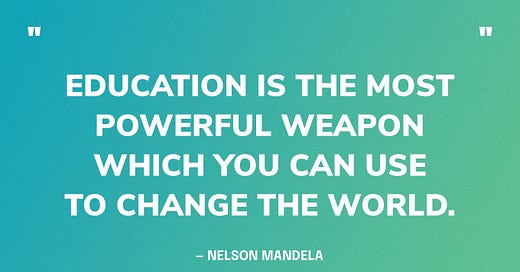Sex education has great potential to educate individuals and society. Let’s explore 4 approaches to sex ed:
1.No conversation 2. Underdeveloped 3.Abstinence 4. Comprehensive
As you read, I invite you to reflect…. What kind of sexuality education do you think you had? What would you like to provide to your children?
No conversation - This is when the adults in a child’s life do NOT talk about sexuality. Any type of sexuality conversation feels culturally forbidden. Parents assume or actively place the responsibility on someone else. Anyone. Children receive piecemeal information that may or may not be accurate or values-aligned. Taboo reigns.
Underdeveloped - This is when adults remain vague around many aspects of sex or lean heavily on euphemisms and metaphor, (ie ‘the birds and the bees’) rather than engaging in interactive discussions. Children are left craving more and filling in gaps with information from peers or other sources.
It’s unclear where the term The Birds and the Bees talk originated. Some say it was inspired by Samuel Taylor Coleridge’s poem, Work without Hope, from 1825.
All Nature seems at work. Slugs leave their lair- The bees are stirring - birds are on the wing - And Winter, slumbering in the open air, Wears on his smiling face a dream of Spring! And I, the while, the sole unbusy thing, Nor honey make, nor pair, nor build, no sing.
The connection between human sexuality, eggs, and pollination is vague. To be blunt, teaching sex with this metaphor is completely outdated.
Bart Simpson spoke of the birds and bees in the episode title Homer vs. Patty and Selma which was broadcast in 1995. The episode includes a scene where Bart feels chipper and says:
“What a day, eh, Milhouse? The sun is out, birds are singing, bees are trying to have sex with them - as is my understanding….”
Abstinence - Children are taught that sex should only occur within a marriage. There is resounding research that shows abstinence focused sex ed is not effective in preventing sex before marriage, nor prolonging sexual activity. Some abstinence programs have been rebranded as Sexual Risk Avoidance Education (SRAE). Fear and shame are often used in an effort to coax behaviors.
An article from Columbia School of Public Health entitled, Abstinence Only is a Failure explains that abstinence-only-until-marriage programs leave all young people unprepared. LGBTQ youth, people who are sexually active, and those who have experienced sexual abuse may even be harmed by some of the explicit or implicit messages.
Funding for sex education programs tends to shift depending on the political party in power. The Hill article discusses the funding shift according to what president is in office.
Comprehensive - Children are taught a holistic understanding of all aspects of human sexuality; human development, relationships, personal skills, sexual behavior, sexual health, cultural awareness, etc… Comprehensive sex ed can be shared in developmentally-appropriate ways, over childhood and adolescence.
The American Academy of Pediatrics tells us about The Importance of Access to Comprehensive Sex Education.
AAP supports broad access to comprehensive sex education, wherein all children and adolescents have access to developmentally appropriate, evidence-based education that provides the knowledge they need to:
Develop a safe and positive view of sexuality.
Build healthy relationships.
Make informed, safe, positive choices about their sexuality and sexual health.
It’s unfortunate that politicians have so much power in deciding what our children learn about their bodies and wellness. Wouldn’t it be great if public school education models used where based on research and what serves children best?
Parents, I think we need to take the matter into our own hands. Let’s normalize small bits of comprehensive sexuality education at home. Not talking is not ok. The birds and the bees is old news. Preventing sex before marriage may not be a top family value (it may.. and that’s ok too). We care about our children’s mental health and their overall wellbeing. Winning Sex Ed is not a competition, it’s about giving our children what they need to grow into healthy adult humans.






